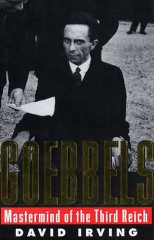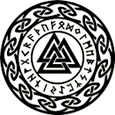
Author : Irving David
Title : Goebbels Mastermind of the Third Reich
Year : 1996
Link download : Irving_David_-_Goebbels_Mastermind_of_the_Third_Reich.zip
ARE man’s intellectual misfortunes visited upon him before birth, like some ineradicable mark of Cain, or is he born free of all attributes? Some basic instincts are inherent, buried deep within the cerebral lobes. That much is clear. Xenophobia; the urge to mate; the instincts to survive and kill, these are as much part of the human mechanism as the escapement is part of the clock. But how is it with the more subtle qualities which, we hope, distinguish man from the lower orders—his powers to persuade and lead, to cheat and deceive? In short, does the infant come upon Earth unable to avoid the destiny already implanted in the neurones of his brain? Is it a genetic lottery? Here, a minute virus ordains that this man shall compose nine symphonies; there, an excess of dopamine will have him hearing the devil’s whispered commands for the remainder of an adult life that may well be curtailed by the hangman’s rope. Every man has some say in his own fortunes. The tangle of nerves and ganglia is not just a rack which passively stores data and impressions. It is open to each brain’s owner to work upon it, to devise by intellectual training the swiftest path between it and the muscles and voice over which it is to be master. From the convolutions in the brain’s left frontal lobe springs forth the voice that commands other men to hate, to march, to dance, to die. Moreover, man can condition this controlling instrument. Man is what he eats, that is true. But his brain is more than that—it is what he has seen about him too. The operas, the great works of art and poetry, the ill-defined sensations of national pride and humiliation, all these impressions are encoded and stored away by the neurons of the brain. And thus gradually one man comes to differ from the next. Since prehistoric times the human brain has remained impenetrable and marvellous. Surgeons have trepanned into the human cranium in the hope of fathoming its secrets. The Greeks, the Romans, and the mediæval Arabs all opened up their fellow humans’ skulls to gaze upon the brain. In 1945 the American army took Benito Mussolini’s brain away for examination; they did the same with Dr. Robert Ley’s brain, and the Russians with Lenin’s. But no instrument has yet explained the brain’s capacity for evil. THE BRAIN which indirectly occupies us now has ceased its machinations one evening in May 1945. Here it is, punctured by a 6·35-caliber bullet, lying in the ruined garden of a government building in Berlin. Next to its owner are the charred remains of a woman, the metal fastenings tumbling out of her singed, once-blonde hair. Around them both, callously grouped for the photographer, stand a Russian lieutenant-colonel, two majors, and several civilians. It is May 2, 1945: five P.M., and the building is the late Adolf Hitler’s Reich Chancellery. The lieutenant-colonel is Ivan Isiavich Klimenko, head of Smersh (a Russian acronym for Soviet Counter-Intelligence) in a Rifle Corps. He has been led here by the Chancellery’s cook Wilhelm Lange and its garage manager Karl Schneider. It has begun to pour with rain. Klimenko’s men slide the two bodies onto a large red-andgilt door torn from the building. They scoop up a fire-blackened Walther pistol found beneath the man’s body, and another pistol found nearby; a gold badge; an engraved gold cigarette case, and other personal effects. All will be needed for identification. Driving a Jeep, Klimenko leads the way back to Smersh headquarters set up in the old jailhouse at Plötzensee. On the following day he returns to the Chancellery, still hunting for the Führer. Below ground, inside the bunker, he finds the bodies of six children in pretty blue nightdresses or pyjamas. He ships them out to Plötzensee too, together with the corpse of a burly German army officer, a suicide. The Russians bring all the guests of the five-star Continental Hotel out to Plötzensee, including a textiles merchant, a chaplain, and a hospital assistant, and invite them to identify the cadavers. Even if the receding hairline, the Latin profile, the overwide mouth, and the unusually large cranium are not clues enough, then the steel splint with its two ringlike clamps to clutch the calf muscles, and the charred leather straps still tying it to the right leg leave no room for doubt at all. The foot is clenched like a dead chicken’s claw: a club foot. This is all that remains of Dr. Joseph Goebbels, the malevolent genius whose oratory once inspired a nation to fight a total war and to hold out to the very end. The Germans carry all the bodies outside on tarpaulins, and a Red Army truck transports them to a villa some ten kilometres north-north-east of Berlin where the Soviets are equipped to perform autopsies. Soviet officers bring in Professor Werner Haase, one of Hitler’s surgeons, and Fritzsche, one of Goebbels’ senior deputies, to view the bodies. Haase identifies them; Fritzsche hesitates, but the club foot and the orthopædic shoe clinch it for him. ‘Check the Gold Party Badge,’ he suggests. The badge is cleaned of soot and dirt, and reveals the number 8762—Goebbels’ membership number in the National Socialist German Workers’ Party (the Nazi party). “It’s Dr. Goebbels,’ Fritzsche confirms. This is almost the last public appearance of Dr. Joseph Goebbels. A few days later the Russians summon Hans Fritzsche out to G.P.U. (secret police) headquarters at Friedrichshagen, in south-east Berlin and show him a notebook partly concealed by a metal plate: he recognizes Goebbels’ handwriting, and asks to see more. The Soviet officer removes the plate and reveals a diary bound in red leather. ‘We found twenty of these, up to about 1941, in the vaults of the Reichsbank,’ he says. The Russians arrange one final identification ceremony. In a copse near Friedrichshagen that Whitsun of 1945 they show Goebbels’ entire family, now resting in wooden coffins, to his former personal detective, the forty year old Feldpolizei officer Eckold. He identifies his former master without hesitation. AMONG the personal effects was a gold cigarette case inscribed ‘Adolf Hitler,’ and dated ‘29.x.34’. That was Paul Joseph Goebbels’ birthday. He had first opened his eyes and uttered his first scream at No.186 Odenkirchener Strasse in the smoky Lower Rhineland town of Rheydt on October 29, 1897; it was a thousand-year old textiles centre, set in a landscape of traditionally pious Catholics and hardworking country folk. ‘The daily visit to church,’ writes Ralf Georg Reuth, Goebbels’ most recent biographer, ‘confession and family prayers at home and their mother making the sign of the cross on her kneeling children’s foreheads with holy water, were as much a part of their life as the daily bread for which their father toiled at Lennartz’ gas-mantle factory.’ Their father Fritz Göbbels—that is the spelling in Paul Joseph’s birth certificate—was W. H. Lennartz & Co’s dependable, Catholic though certainly not bigoted bookkeeper. It is not over fanciful to suspect that he chose the child’s second name in honour of Dr Josef Joseph, a revered local Jewish attorney and close family friend; the child had often been sent round to talk literature with this neighbour. Fritz persevered with the Lennartz company almost until he died, struggling, through thrift and application, to provide a better life for his family than he had known himself. He himself had been born here to a tailor’s family from Beckrath south-west of Rheydt. He had the same bulbous nose as his father Conrad Göbbels and as his brother Heinrich, a paunchy commercial traveller in textiles with all the ready wit that Fritz so sorely lacked. Fritz’s mother Gertrud was a peasant’s daughter. From first to last his relations with his youngest son Joseph were strained. Aware that his own career would see little more advancement, he made sacrifices for ‘little Jupp’ (Jüppche), which were most inadequately repaid. He struggled painfully for promotion in the firm from errand boy to clerk, then to bookkeeper with a starched collar, and finally director in the obligatory stovepipe hat. As his father’s life drew to its close years later, Joseph would see in him only a ‘petty minded, grubby, beer swilling pedant, concerned only with his pathetic bourgeois existence and bereft of any imagination.’ Among his effects were found blue cardboard account books in which he had detailed every penny he had spent since marriage.Conceding grudgingly that his father would in all likelihood go to Heaven, Joseph would write: ‘I just can’t understand why Mother married the old miser.’He painted a picture of his father lying in bed three-quarters of the day, then reading papers, drinking beer, smoking and cursing his wife, who had already been about her housework since six A.M. His sympathies were all with her. ‘I owe her all that I am,’ he once wrote; and he remained beholden to her all his life. He had his mother’s astute features—the face perceptibly flattened at each side, the nose slightly hooked, the upper front teeth protruding. She had been born Katharina Maria Odenhausen in the village of Uebach-over-Worms in Holland, and occasionally she lapsed into Rhenish Plattdeutsch when speaking with Joseph. Her father was a muscular Dutch blacksmith with a long beard, a man Joseph would look back upon as the dearest of his ancestors. He died in the Alexianer monastery at Mönchen-Gladbach of apoplexy. Her mother had then moved into Germany to serve as housekeeper to a distant relative, a local rector at Rheindahlen; she had spent her youth there with all her brothers and sisters except for Joseph Odenbach, Goebbels’s architect godfather, who had stayed at Uebach. It was at Rheindahlen that Katharina had met Fritz Göbbels and married him in 1892. So much for Goebbels’ parents. Two sons had arrived before him, Konrad and Hans. Three sisters followed him: two, Maria and Elisabeth, died young, a third, also christened Maria, was born twelve years after Joseph. We shall occasionally glimpse Konrad and Hans, struggling through the depression until Joseph’s rise to power from which they too profited, being appointed to head Nazi publishing houses and insurance associations respectively. Maria remained the apple of his eye. Through living frugally, and thanks to a pay rise to 2,100 marks per annum, in 1900 his father was able to purchase outright a modest house at No.140 Dahlener Strasse in Rheydt (still standing today as No.156). There was no front garden; its two bare windows beside the front door still overlook a monumental mason’s yard. Young Joseph had his room under the sloping roof, his mansard window’s view limited to the skies above. This remained ‘home’ for him, the fulcrum of his life, long after he left it as a young man. He remembered his sickly earliest years only dimly. He recalled playing with friends called Hans, Willy, Otto (whom he knew as ‘Öttche’) and the Maassen brothers, and a bout of pneumonia which he only barely survived. He was always a little mite of a fellow. Even in full manhood he would weigh less than one hundred pounds. ...

Tourney Phillip - What I saw that day
Authors : Tourney Phillip F. - Glenn Mark Title : What I saw that day Year : 2011 Link download :...














